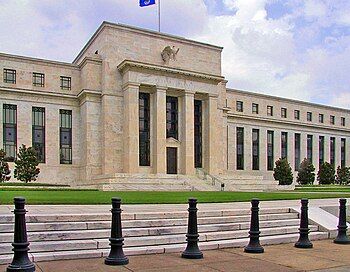Portal:Business
The Business and Economics Portal Business is the practice of making one's living or making money by producing or buying and selling products (such as goods and services). It is also "any activity or enterprise entered into for profit." A business entity is not necessarily separate from the owner and the creditors can hold the owner liable for debts the business has acquired. The taxation system for businesses is different from that of the corporates. A business structure does not allow for corporate tax rates. The proprietor is personally taxed on all income from the business. A distinction is made in law and public offices between the term business and a company such as a corporation or cooperative. Colloquially, the terms are used interchangeably. (Full article...) Economics (/ˌɛkəˈnɒmɪks, ˌiːkə-/) is a social science that studies the production, distribution, and consumption of goods and services. Economics focuses on the behaviour and interactions of economic agents and how economies work. Microeconomics analyses what is viewed as basic elements within economies, including individual agents and markets, their interactions, and the outcomes of interactions. Individual agents may include, for example, households, firms, buyers, and sellers. Macroeconomics analyses economies as systems where production, distribution, consumption, savings, and investment expenditure interact, and factors affecting it: factors of production, such as labour, capital, land, and enterprise, inflation, economic growth, and public policies that have impact on these elements. It also seeks to analyse and describe the global economy. (Full article...) Selected articleThe slate industry in Wales began during the Roman period when slate was used to roof the fort at Segontium, modern Caernarfon. The slate industry grew slowly until the early 18th century, from when it expanded rapidly and reached its peak output in the late 19th century, at which time the most important slate producing areas were in north-west Wales. These included the Penrhyn Quarry near Bethesda, the Dinorwig Quarry near Llanberis, the Nantlle Valley quarries and Blaenau Ffestiniog, where the slate was mined rather than quarried. Penrhyn and Dinorwig were the two largest slate quarries in the world, and the Oakeley mine at Blaenau Ffestiniog was the largest slate mine in the world. The Great Depression and the Second World War led to the closure of many smaller quarries, and competition from other roofing materials, particularly tiles, resulted in the closure of most of the larger quarries in the 1960s and 1970s. Slate production continues on a much reduced scale. Selected image
Selected economy The economy of Kazakhstan is the largest in Central Asia in both absolute and per capita terms. As of 2023, Kazakhstan attracted more than US$370 billion of foreign investments since becoming an independent republic after the dissolution of the former Soviet Union. It possesses oil reserves as well as minerals and metals. Almost every known element on the periodic table can be found in Kazakhstan. It also has considerable agricultural potential, with its vast steppe lands accommodating both livestock and grain production. The mountains in the south are important for apples and walnuts; both species grow wild there. Kazakhstan's industrial sector rests on the extraction and processing of these natural resources. (Full article...) Selected quote"Therefore, when a small group of men approach Congress in order to induce the committee concerned to concur in certain legislation, nobody knows the ramifications of the interests which those men represent; there seems no frank and open action of public opinion in public counsel, but every man is suspected of representing some other man and it is not known where his connections begin or end. I am one of those who have been so fortunately circumstanced that I have had the opportunity to study the way in which these things come about in complete disconnection from them, and I do not suspect that any man has deliberately planned the system. I am not so uninstructed and misinformed as to suppose that there is a deliberate and malevolent combination somewhere to dominate the government of the United States. I merely say that, by certain processes, now well known, and perhaps natural in themselves, there has come about an extraordinary and very sinister concentration in the control of business in the country. However it has come about, it is more important still that the control of credit also has become dangerously centralized. It is the mere truth to say that the financial resources of the country are not at the command of those who do not submit to the direction and domination of small groups of capitalists who wish to keep the economic development of the country under their own eye and guidance. The great monopoly in this country is the monopoly of big credits. So long as that exists, our old variety and freedom and individual energy of development are out of the question. A great industrial nation is controlled by its system of credit. Our system of credit is privately concentrated. The growth of the nation, therefore, and all our activities are in the hands of a few men who, even if their action be honest and intended for the public interest, are necessarily concentrated upon the great undertakings in which their own money is involved and who necessarily, by very reason of their own limitations, chill and check and destroy genuine economic freedom. This is the greatest question of all, and to this statesmen must address themselves with an earnest determination to serve the long future and the true liberties of men."
TopicsRelated WikiProjectsDid you know (auto-generated) -
On this day in business history
General imagesThe following are images from various business-related articles on Wikipedia.
More did you know
Business news
SubcategoriesRelated portals
Things you can doUrgent and important articles are bold
WikimediaThe following Wikimedia Foundation sister projects provide more on this subject:
SourcesDiscover Wikipedia using portals |







































